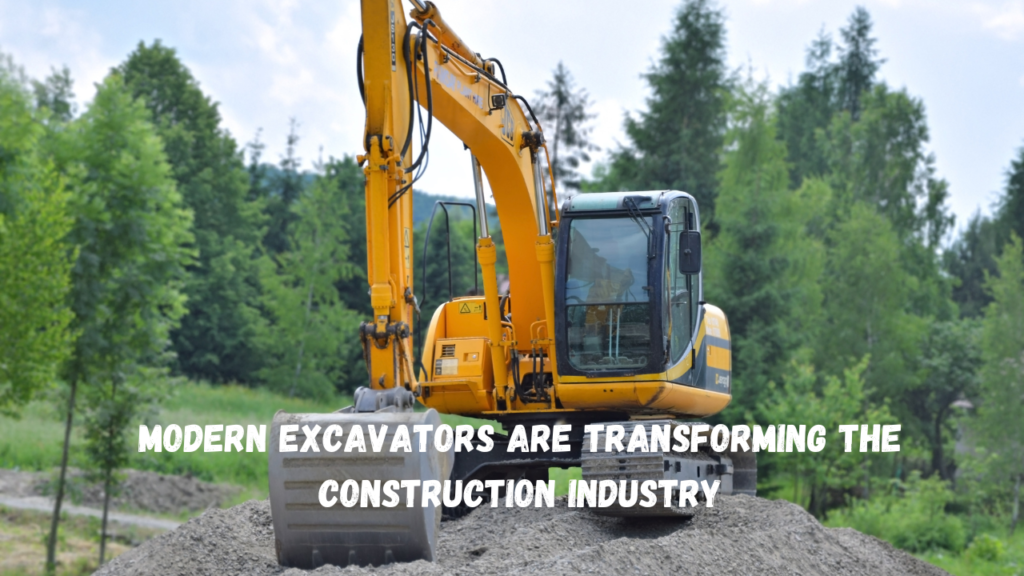Introduction
Excavators have always been pivotal to the construction industry. From urban projects to massive infrastructure developments, these versatile machines are essential for completing various tasks efficiently. With advancements in technology, modern excavators offer even greater capabilities. If you’re considering investing in an excavator for sale, it’s essential to understand how these machines have evolved to provide more features and benefits.
Integrating advanced technology in excavators has significantly improved their functionality and efficiency. These advancements are transforming the construction landscape, making it crucial for industry professionals to stay informed about these powerful machines’ latest trends and capabilities. The modern construction site is increasingly complex, and having the right equipment can make all the difference in project success.
Technological Advancements in Excavators
The incorporation of state-of-the-art technology in modern excavators is nothing short of revolutionary. Today’s machines have GPS systems, real-time analytics, and next-gen hydraulics. These features enable operators to perform tasks with exceptional precision and control. For instance, GPS technology allows for accurate project layouts and ensures excavation work sticks to specified parameters. The real-time data capabilities also provide valuable insights, enabling operators to adjust techniques on the fly to improve efficiency.
Additionally, integrating next-gen hydraulic systems allows for smoother and more responsive movements, which helps handle delicate tasks more efficiently. Automated features such as machine learning algorithms can predict and adjust the machine’s performance based on the type of task being performed, enhancing not only productivity but also the longevity of the equipment.
Enhanced Efficiency and Productivity
Excavators’ technological advancements directly enhance their efficiency and productivity. Automated features dramatically cut down the time required to complete complex tasks. Intelligent systems integrated within these machines allow operators to plan and execute work more effectively, reducing downtime and increasing overall project efficiency. An instance of this is when intelligent excavators are programmed to handle repetitive tasks with minimal human involvement, thus enabling operators to concentrate on the more intricate aspects of the project.
Key Features Driving Efficiency
- Automated controls and settings
- Real-time data collection and analysis
- Advanced hydraulic systems
- Precision GPS technology
Automated controls and settings simplify the process of carrying out intricate tasks like digging trenches or lifting heavy loads with precision. Operators can make quick, informed decisions that streamline workflow through real-time data collection and analysis. Advanced hydraulic systems provide smoother and more responsive control, allowing for precise movements and efficient use of power. Advanced GPS technology guarantees accurate completion of all excavation tasks, minimizing errors and the need for rework.
Safety First: Improved Safety Features
Safety has always been a priority in the construction industry, and modern excavators embody this ethos with enhanced safety features. These advancements, from operator-assist technologies to automatic shutdown systems, drastically reduce the risk of accidents on-site. Enhanced visibility from advanced camera systems and sensors further creates a safer work environment. For instance, modern excavators come equipped with 360-degree cameras, allowing operators to see their surroundings in real time and avoid potential hazards.
In addition to enhanced visibility, modern excavators also feature operator-assist technologies such as collision detection and avoidance systems. These systems utilize sensors to identify barriers and autonomously modify the machine’s motions to avoid accidents. Automatic shutdown systems are another critical safety feature, as they can quickly stop the machine in an emergency, reducing the risk of injury to operators and other workers on-site.
Eco-Friendly Innovations
As global awareness of environmental sustainability grows, the construction industry is making notable strides towards eco-friendly practices. Modern excavators are built to be more economical in fuel usage and emit less pollutants. Some models even feature hybrid or fully electric engines. These changes not only benefit the environment but also reduce long-term operating costs.
Advanced technology is applied to fuel-efficient engines to maximize fuel usage, reduce emissions and decrease operating expenses. Electric and hybrid models offer an even more significant reduction in environmental impact, as they produce zero emissions during operation. These eco-friendly innovations are becoming increasingly important as stricter environmental regulations are implemented worldwide. By implementing these technologies, construction companies can decrease their ecological impact and help build a more eco-friendly future.
Key Eco-Friendly Features
- Fuel-efficient engines
- Electric and hybrid models
- Reduced carbon emissions
- Use of sustainable materials
Using sustainable materials in constructing and maintaining modern excavators also contributes to their eco-friendliness. For instance, some companies are currently utilizing recycled materials for machine parts, decreasing the environmental effects of manufacturing. These initiatives aim to conserve natural resources and encourage a circular economy by reusing and repurposing materials instead of throwing them away.
Cost-Effectiveness and ROI
Investing in modern excavators brings substantial long-term financial benefits. Although the initial investment may be high, the returns are well worth it. Enhanced efficiency leads to lower fuel costs and reduced maintenance expenses. Furthermore, the increased productivity results in quicker project completion, improving overall profitability. Companies that invest in these advanced machines often find that the initial costs are quickly offset by the savings and increased revenue generated by enhanced performance.
Modern excavators’ cost-effectiveness is further enhanced by their durability and longevity. Contemporary machinery is designed to endure demanding environments and constant usage, decreasing the necessity for frequent maintenance and substitutions. This dependability results in reduced maintenance expenses and decreased periods of inactivity, enabling construction firms to finish projects punctually and within the allocated budget.
Factors Contributing to Cost-Effectiveness
- Lower fuel consumption
- Reduced need for frequent maintenance
- Higher productivity rates
- Reduced labor costs
Lower fuel consumption results in significant cost savings over the machine’s life. The reduced need for frequent maintenance lowers repair costs and minimizes downtime, allowing projects to stay on track. Higher productivity rates enable construction companies to take on more projects simultaneously, increasing revenue potential. Automating repetitive tasks helps decrease labour expenses, allowing the operators to dedicate their time to more intricate and valuable tasks.
Future Trends in Excavation Technology
The future of excavators holds exciting prospects. Continuous advancements such as autonomous excavators and AI integration are set to redefine the construction industry. Autonomous excavators, equipped with cutting-edge sensors and machine learning algorithms, can perform tasks with minimal human intervention, increasing efficiency and reducing labour costs. AI integration allows for real-time data analysis and predictive maintenance, ensuring machines operate at peak performance.
Further developments in eco-friendly technologies also promise to make construction more sustainable. Innovations are likely to play a significant role in the future of excavation. These advancements will help reduce the environmental impact of construction activities and support global efforts to combat climate change.
Final Thoughts
Modern excavators are driving significant changes in the construction industry. Advanced technology, such as advanced battery technology and renewable energy sources, improved safety features, and eco-friendly innovations, makes these machines indispensable. Investing in these technological marvels can lead to more efficient, safe, and sustainable construction projects. Keeping up with these innovations will be essential to staying ahead as the industry progresses.
The construction industry is pivotal, and embracing new technologies and sustainable practices can lead to a brighter future. Modern excavators are at the forefront of this transformation, offering unparalleled efficiency, safety, and environmental benefits. By investing in these machines, construction companies can enhance their profits and help create a more eco-friendly and ethical sector.














